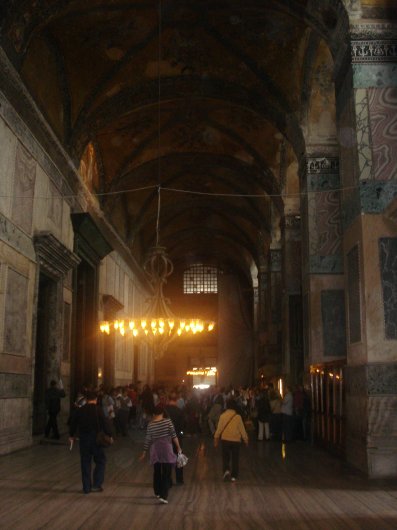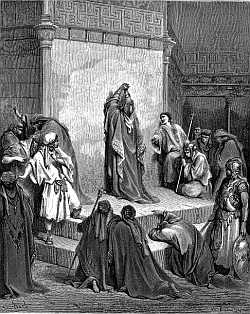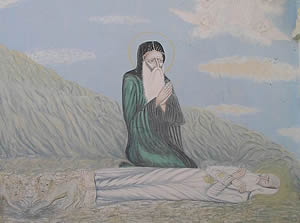Sinners in the Hands of an Angry Blogger
Update on Haiti: Don’t be discouraged by the reports of overwhelming aid, and too much of one thing at one time. The aid is going to be needed for the long haul. There is no decent running water, and where that’s true, and people have no homes, families are destroyed, and most things are just a pile, it’s going to be an ongoing need to get people to the point they can survive and rebuild. The “overwhelming” part is a testament to how quickly the world responded – quicker than ever before on anything. The duplication – e.g. with so many countries sending field hospitals – demonstrates the need for better international coordination of aid. We still act like nations – we still believe in the made-up construct of nationhood and act in a disjointed way, because of it. At a minimum, we need to act as a federation of nations, with some federal coordination. But that doesn’t mean the ongoing aid is not needed. Please keep helping.
As usual, that was preface, and I don’t intend a discourse on the passion of anger or divine anger or any such thing. It’s preface to personal confession. I experience anger whenever I start something new. It’s a kind of outrage. And I don’t know if it’s the passion of anger or not. I’m not going to try to sort that out here. It’ll take more than a platitude or two. I just know it’s there. When I first decided to work for myself, I felt anger at all the pretences that had been foisted on me by the culture and corporate life, the bondage I had placed in, unknowingly, since infancy – sculpted to become a slave. And I spent the first weeks after expressing that anger, or outrage, or what have you. When battered by ridiculous pagan mantras (no negative energy, no negative energy…) I became outraged and began throwing those shackles off. It felt as if they would handcuff me to something that can’t sustain life, mold me into the output of a philosophical meat grinder – a concept not a human. Nothing more complex than a few mantras. And I railed against it. When I began writing again here, I also felt anger. Anger at the chains put on others, and the chains once clamped on me. And I cried out and am still crying out against them. If my experience here matches the other venues, this will last a while, and then it’ll be done, and I’ll either talk about other things or have nothing more to say for a while, so that it becomes a protest venue, for when raids are made against my sanity and my liberty by the world. I don’t know which it’ll be, of course.You know, we deny that there is such a thing as righteous anger, good anger, or the anger of God – if, by that, we mean anything remotely like human anger. God is not subject to the passions, because God is not subject to death. To deny this is to make God part of the universe – not the creator, but rather himself the created. To deny it is heresy and gnosticism. It is also to turn the scriptures against themselves, a common characteristic of both gnosticism and Protestantism – quoting proof texts that elsewhere are seemingly contradicted. When the Apostle calls anger a passion, how then can the prophets say that God is angry? The apparent disymmetry comes from attempting to treat the scriptures like a book, external and separate from the thinking community that wrote them – external to its liturgy, it’s understanding. And even now, as people convert to Orthodoxy, from other religions or from the culture at large, they bring with them this disymmetry and find it difficult to learn to understand the holy scriptures in an Orthodox manner. As Christ said, “let him who has ears to hear, let him hear”. It is difficult to hear when listening with ears that are alien to the faith of the first man, the faith of our fathers, the faith of all ages. But the Orthodox mind does not attribute anger to God as some higher form of the passion experienced by man, any more than we can think that God forgets or that God grows weary. Genuine Christianity is all of one piece, not a jumble of statements in a book that you can toss onto your kindle and get your head around on a plane. In fact, the more people attempt that, the less they really understand, because they acquire the delusion that they have understood. The books are liturgical, and cannot be understood externally to the liturgy. That’s just the facts.
I believe anger is so often the result of pain. I know from experience that mine is. The Haiti thing tho is the latest example. I think it’s one thing to listen to ongoing interviews on the ground, listen to people pulled from the wreckage, listen to the husbands burying their wives, listen to the overwhelmed doctors and the people trying to find others in the rubble, and the people learning that their loved ones have died. When you listen to that, if you’re human, if you haven’t converted your humanity into ideology, which is genocide on all human beings everywhere for all time – Christ included, you feel… solidarity, symmetry with the suffering, pain. Not pain like theirs, not suffering like theirs. After all, you have a radio, you are driving a car, you are on the way to buy food or to earn money. You take a drink of water or coffee and you have everything they do not have. You cannot feel what they feel. But you don’t feel nothing, either, unless you’ve killed your human soul. You feel pain.
It’s another thing entirely to listen to 40-second clips on TV news punctuating 3-hour rants by a Rush Limbaugh figure on how it’s being politicized, ironically politicizing it just by making that statement. Over and over, building it into an ideological agenda. No pain, no humanity, just ideology. An intellectual meat grinder for quasi-intellectual, half-intelligent armchair philosophers. The Sadducees of our time. The cultural gnostics. There is no Christianity in that. To borrow from Lewis Black, right wing, conservative cultural religion is to Christianity what KFC is to chicken. And it distorts, warps, and finally deprives one of humanity. It eradicates the human soul, substituting for it a set of platitudes, much like Protestantism and gnosticism from which, unrealized perhaps by the listener, it originates. It is the translation of those premises into popular culture.
And it doesn’t let you feel pain, it causes pain. It doesn’t lessen the suffering of the world, it adds to it. And when you feel the pain in your soul that is the shared life with other human beings, and someone comes along and turns on a loudspeaker of droning, caustic, antagonistic vitriol against and pollution of the fundamental connection we share with all of creation, and foremost with all human beings, not only are they attacking the gospel, by which God became a human being, the very meaning of salvation – the Incarnation, they are trying to crumble the underpinnings of your human soul – creating their own earthquake, their own disturbance, to bring down the part of you that makes you a man. And the pain felt by sharing, by connection, by what we Christians can only reach for and describe as love, is drowned out by the pain of blunt trauma to all connections, all sharing, all solidarity, in fact to the very nature and essence of man, which is one thing, summed up in Christ, expressed in the diversity of all. And that pain fills me with outrage. It makes me angry. And I try to overcome the passion. And fathers help me, saints save me, but I don’t know whether what’s left is my sin or something else. St. John Cassian, I completely submit to thy teaching that there is no righteous anger. And I have no recourse but to do as the fathers tell me – namely, when in doubt, attribute sin to myself, and so escape the wrath of God, which is not like my illicit wrath, not a more nobler version, but is justice in the very uncreate energies of an all-consuming God. Consume me so I am not destroyed. Consume me, so that my life is preserved.
We say, among the faithful, that God does not absorb us. But union with God, theosis, to be consumed, is the very preservation of our unique persons, the very protection of diversity, while the God who became man, wedding but not confusing the two natures, joined in on person, joins us to himself. It is not a thing for the armchair theologian. It is a thing to understand by becoming a real part of the community of people whose liturgy expresses through the year the mystery of this union, enacted through the days of the calendar and the fasts and the feasts, and in the life inside the timeless temple that is one with the temple in Heaven, all us with the angels in the one liturgy, with all the Saints, everywhere unceasingly, mystically representing the Cherubim, finding thereby the union with “all mortal flesh”.
That talk radio garbage is an outrage against God and an enmity with all men. But I don’t wish to fight on God’s behalf. I am not a nice man. I am “meaner” than that. The worst thing one can do to one’s enemies is to refuse to strike them, consigning them instead to the judgment of God. Christ withheld his hand, though he could have turned the world inside out and swallowed them in flame bathed in blood. But he went like a lamb. “I am not here to judge. There is one who judges.” How foolish to think this means he was not hear to point out wrong and elevate good. He did precisely that, all the time. No, but real judgment is when God decides what to do with each of us. And that is a “terrifying thing”, is it not? I am angry, but I am trying not to strike, because God will do what is right, and know what is right, and the passions will not be his guide. He is ever free from Death, and has liberated us likewise to his freedom. I wish to go into it. Lord have mercy.

 I have spent most of my younger Orthodox life being most concerned about offending God. Myself offending God. Others offending God. My people (us) offending God.
I have spent most of my younger Orthodox life being most concerned about offending God. Myself offending God. Others offending God. My people (us) offending God. So often, “love”, philosophical love, is held up in dichotomy with whatever the speaker doesn’t like. If you want to discuss getting rid of the pews and the organ, invariably someone will say “love is the most important thing.” If you want to talk of our obligations to fast and pray, you’ll hear “love is over all.” Usually, this is just a way of dismissing any unwanted or unliked discussion or suggestion, and represents an unanswerable superiority. It’s what logicians call a “thought terminating cliche” – a cliche that quells thought itself. In short, it’s talking of love without having love. It’s idle talk. Theory. The presumption is that this vision of love is something the speaker has, or knows of, and so is somehow elevated above the things that concern others, above the conversation.
So often, “love”, philosophical love, is held up in dichotomy with whatever the speaker doesn’t like. If you want to discuss getting rid of the pews and the organ, invariably someone will say “love is the most important thing.” If you want to talk of our obligations to fast and pray, you’ll hear “love is over all.” Usually, this is just a way of dismissing any unwanted or unliked discussion or suggestion, and represents an unanswerable superiority. It’s what logicians call a “thought terminating cliche” – a cliche that quells thought itself. In short, it’s talking of love without having love. It’s idle talk. Theory. The presumption is that this vision of love is something the speaker has, or knows of, and so is somehow elevated above the things that concern others, above the conversation. The liturgy says, “With fear of God, with faith and love draw near”. Some enterprising revisionists have expurgated the word ‘fear’, not understanding it, or sharing the Faith of our fathers who prayed this, and saved themselves, and then led us to the Faith. One writer has said, in true Orthodox fashion, that these correspond not only to the psychology of fear, faith, and love, but to the parts of the temple as well as to progress in Orthodoxy. Fear corresponds to the outer part of the temple, the narthex, and to the beginning of Christianity, by which we learn reverence, respect, awe, honor, the height of God and depth of our sin. And we never lose this, if we remain faithful. Faith represents the inner part of the temple, the nave, and standing with the faithful, confessing the true doctrines of the Church and singing true prayers. Love represents the chalice itself, the altar, and our approaching it, keeping in mind the prayers of access that we say (“that with boldness and without condemnation”), and the fullness of life in Christ and therefore life with each other – the peace with God that brings peace among all men.
The liturgy says, “With fear of God, with faith and love draw near”. Some enterprising revisionists have expurgated the word ‘fear’, not understanding it, or sharing the Faith of our fathers who prayed this, and saved themselves, and then led us to the Faith. One writer has said, in true Orthodox fashion, that these correspond not only to the psychology of fear, faith, and love, but to the parts of the temple as well as to progress in Orthodoxy. Fear corresponds to the outer part of the temple, the narthex, and to the beginning of Christianity, by which we learn reverence, respect, awe, honor, the height of God and depth of our sin. And we never lose this, if we remain faithful. Faith represents the inner part of the temple, the nave, and standing with the faithful, confessing the true doctrines of the Church and singing true prayers. Love represents the chalice itself, the altar, and our approaching it, keeping in mind the prayers of access that we say (“that with boldness and without condemnation”), and the fullness of life in Christ and therefore life with each other – the peace with God that brings peace among all men. I have found that it is possible for a person to be Orthodox, in the sense that they are baptized, chrismated, do penance, and receive communion, and yet not be Christian. Likewise, it seems possible for an organization to be an Orthodox Church, but not be a Christian community. This will seem controversial, but I think it’s so.
I have found that it is possible for a person to be Orthodox, in the sense that they are baptized, chrismated, do penance, and receive communion, and yet not be Christian. Likewise, it seems possible for an organization to be an Orthodox Church, but not be a Christian community. This will seem controversial, but I think it’s so. I was led to the Faith by a priest who had introduced many others to Orthodoxy as well. I began a series of discussions with a friend who hated Christianity, and over time, he began to soften. I introduced him to my priest, and he completed his conversion. He then began conversations with a younger mutual friend and led him to the Faith along with his wife and several children and became a godparent. They are all Orthodox now. I began another series of conversations, and created a reading society, for a man who likewise had great disdain for Christianity. He considered himself an academic, and I introduced him to the patristic writings of the Orthodox Fathers, the historical writings of Fr. John Romanides, and others. He decided to become a catechumen, and I took him to a priest, and that happened. I spoke with his wife also, and they both converted, received Holy Matrimony, and his children have became cradle Orthodox. In short, generations of people could be written as a geneology of movement into the Faith because of my mentor (and those who led him), and myself in my unworthiness. …
I was led to the Faith by a priest who had introduced many others to Orthodoxy as well. I began a series of discussions with a friend who hated Christianity, and over time, he began to soften. I introduced him to my priest, and he completed his conversion. He then began conversations with a younger mutual friend and led him to the Faith along with his wife and several children and became a godparent. They are all Orthodox now. I began another series of conversations, and created a reading society, for a man who likewise had great disdain for Christianity. He considered himself an academic, and I introduced him to the patristic writings of the Orthodox Fathers, the historical writings of Fr. John Romanides, and others. He decided to become a catechumen, and I took him to a priest, and that happened. I spoke with his wife also, and they both converted, received Holy Matrimony, and his children have became cradle Orthodox. In short, generations of people could be written as a geneology of movement into the Faith because of my mentor (and those who led him), and myself in my unworthiness. … August Rush is a film about the connection that love creates between human beings. Orson Scott Card’s science fiction describes this as “philotic” strands that join anyone in the universe that is involved in someone else’s life. His primary character Ender, in that now classic series, says (to paraphrase) “I think once you know someone, know what they want and need, even an enemy, it is impossible not to love him.” August Rush is art about strands as frail as hope. It’s about want and need, and the quest for meaning in individual lives. All men seek meaning, and it is always there for us, if we take it. The film is a kind of Pilgrims Progress, as well, that reminds us we might spend years walking down a path of forgetfulness, not even thinking of the path less taken.
August Rush is a film about the connection that love creates between human beings. Orson Scott Card’s science fiction describes this as “philotic” strands that join anyone in the universe that is involved in someone else’s life. His primary character Ender, in that now classic series, says (to paraphrase) “I think once you know someone, know what they want and need, even an enemy, it is impossible not to love him.” August Rush is art about strands as frail as hope. It’s about want and need, and the quest for meaning in individual lives. All men seek meaning, and it is always there for us, if we take it. The film is a kind of Pilgrims Progress, as well, that reminds us we might spend years walking down a path of forgetfulness, not even thinking of the path less taken. This is, in fact, the theme of every zombie-genre film from 28-Days to I am Legend: a race of people who are sick and who turn on any one who is not sick.
This is, in fact, the theme of every zombie-genre film from 28-Days to I am Legend: a race of people who are sick and who turn on any one who is not sick.